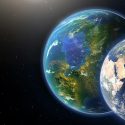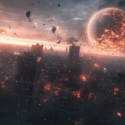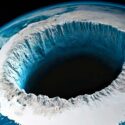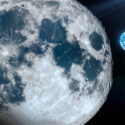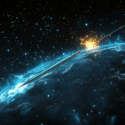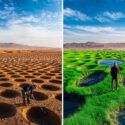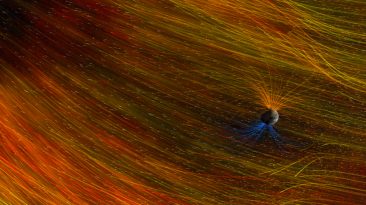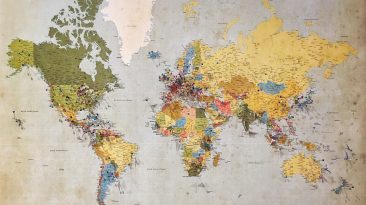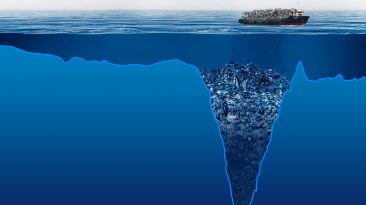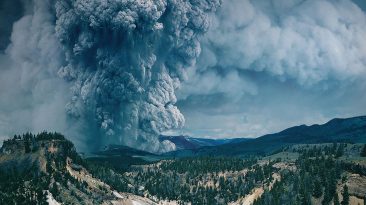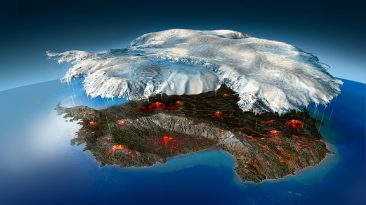It’s a small world after all, because today, we’re shrinking Earth to the size of Pluto. But if our planet was this tiny, how would it alter the atmosphere? Why would the Earth get hotter? And how would gravity affect our water supply?
Pluto sits on the Solar System’s edge, just beyond Neptune’s orbit. It was once considered a planet. But then in 2006 scientists demoted this celestial body to a dwarf planet. All because Pluto isn’t big enough to gravitationally dominate in its own orbit. After all, this dwarf planet is only two-thirds the diameter of our Moon.
So if Earth were as tiny as Pluto, how would eight billion people fit on it? Say goodbye to your personal elbow room. We would have to fit everyone into an area slightly bigger than Russia, 71% of which would be covered with oceans. But the good news is this shrunken Earth would still have room for everyone. Just barely.
You and every person on the planet would have about 1.5 tennis courts to themselves. The problem is that doesn’t take into account the space we still need for hospitals, airports and roads. Once we build those, things would start getting cramped. Add to that all the uninhabitable areas like deserts and mountains, and you won’t have enough room to comfortably fit everyone.
But if you’re looking for a quick escape, it would be easy for you to make a break for it. One jump could catapult you almost 7.6 m (25 ft) into the air. That leap would last for almost 10 seconds, giving you a spectacular view of the horizon. You could also run faster since there would be less friction. Watch out for slick surfaces.
They could send you flying long distances because there wouldn’t be enough gravity keeping you in place. Refrain from over-exerting yourself with all this running. On this dwarf planet, the air pressure would also be small. So no matter where you’re at, it would feel like standing on a mountaintop 5,000 m (16,404 ft) high.
With less oxygen to breathe, you would be constantly gasping for air. If you’re lucky, this high-altitude sickness will leave you light-headed. If you’re unlucky, it could kill you. But even that wouldn’t be the worst-case scenario if the Milky Way always had a mini-Earth. Technically, the lack of gravity would make Earth unhabitable.
A 2019 Harvard study found out that a planet needs a mass of at least 2.7% of the Earth to keep water on the surface. If Earth had formed to be the size of Pluto 4.5 billion years ago, it would never have its mighty oceans. But how would this affect the Moon? Pluto’s largest moon, Charon, doesn’t orbit the dwarf planet.
Instead, the two bodies are tidally locked with the same sides always facing each other. Our dwarf Earth would be would be forever facing the Moon in the same position, locked in place by a common center of mass caused by our competing gravitational pulls. All of this would be the least of our problems. If Earth was this small, its inner core would be much cooler.
That might sound good at first. Earthquakes would stop because there wouldn’t be shifting tectonic plates anymore. Volcanos would become harmless mountains. Unfortunately, Earth wouldn’t have a protective magnetic field without the hot molten core. With this gone, the radiation from the Sun would fry the planet.
What if Earth wasn’t formed to be the size of Pluto? What if instead, it suddenly shrunk? Well, then our planet would keep its mass. That would make the surface gravity 30 times stronger than what is now. With intense training, the human body can survive on a planet with four times the Earth’s gravity. A planet with 10 times the gravity of Earth? That would break your bones.
If you weighed 75 kg (165 lb) before, now you would weigh around 2,300 kg (5,000 lb). Every move you make would take serious muscle power and you may not have it in you, no matter how hard you try. An instantaneous dwarf Earth would cause mass devastation. It could destroy everything we love about this planet and leave humanity hanging on for dear life.
Sources
- “What Is A Dwarf Planet?”. 2015. jpl.nasa.gov.
- “Dwarf Planet Pluto: Facts About The Icy Former Planet”. Charles Q. Choi, Scott Dutfield. 2022. space.com.
- “Is Pluto smaller than Russia? 5 amazing facts linking Russia & space”. 2019. rbth.com.
- “What Is The Surface Area Of The Earth?”. Matt Williams. 2017. universetoday.com.
- “Current World Population”. 2022. worldometers.info.



